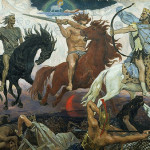We run our website the way we wished the whole internet worked: we provide high quality original content with no ads. We are funded solely by your direct support. Please consider supporting this project.

God is Like a Trojan Horse
Yesterday, I introduced a basic understanding of the Christus Victor view of Christ’s work on the cross. [Click here to read it.] Today, I want to expand on this briefly.
Because God is a God of love who gives genuine “say-so” to both angels and humans, God rarely accomplishes his providential plans through coercion. God relies on his infinite wisdom to achieve his goals. Nowhere is God’s wisdom put more on display than in the manner in which he outsmarted Satan and the powers of evil, using their own evil to bring about their defeat.
Most readers probably know the famous story from ancient Greece about the Trojan Horse. To recap the story, Troy and Greece had been locked in a ten-year-long vicious war when, according to Homer and Virgil, the Greeks came up with a brilliant idea. They built an enormous wooden horse, hid soldiers inside and offered it to the Trojans as a gift, claiming they were conceding defeat and going home. The delighted Trojans accepted the gift and proceeded to celebrate by drinking themselves into a drunken stupor. When night came and the Trojan warriors were too wasted to fight, the Greeks exited the horse, unlocked the city gates to quietly let all their compatriots in, and easily conquered the city, thus winning the war.
Historians debate whether any of this actually happened. But either way, as military strategies go, it’s brilliant.
Now, there are five clues in the New Testament that suggest God was using something like this Trojan Horse strategy against the powers when he sent Jesus into the world.
1) The Bible tells us that God’s victory over the powers of darkness was achieved by the employment of God’s wisdom and was centered on Jesus Christ becoming a human (Rom 16:25; I Cor 2:7; Eph 3:9-10; Col 1:26). It also tells us that, for some reason, this Christ-centered wisdom was kept “secret and hidden” throughout the ages. It’s clear from this that God’s strategy was to outsmart and surprise the powers by sending Jesus.
2) While humans don’t generally know Jesus’ true identity during his ministry, demons do. They recognize Jesus as the Son of God, but, interestingly enough, they have no idea what he’s doing on earth (Mk 1:24; 3:11; 5:7; Lk 8:21). Again, the wisdom of God in sending Jesus was hidden from them.
3) We’re told that, while humans certainly share in the responsibility for the crucifixion, Satan and the powers were working behind the scenes to bring it about (Jn 13:27, cf. 1 Cor 2:6-8). These forces of evil helped orchestrate the crucifixion.
4) We’re taught that if the “rulers of this age” had understood the secret wisdom of God, “they would not have crucified the Lord of glory” (I Cor 2: 8, cf. vss 6-7). Apparently, Satan and the powers regretted orchestrating Christ’s crucifixion once they learned of the wisdom of God that was behind it.
5) Finally, we can begin to understand why the powers came to regret crucifying “the Lord of glory” when we read that it was by means of the crucifixion that the “charge of our legal indebtedness” was “canceled” as the powers were “disarmed.” In this way Christ “triumphed over” the powers “by the cross” and even “made a public spectacle of them” (Col. 2:14-15). Through Christ’s death and resurrection God’s enemies were vanquished and placed under his feat.
Putting these five clues together, we can discern God’s Trojan Horse strategy in sending Jesus.
The powers couldn’t discern why Jesus came to earth because God’s wisdom was hidden from them. God’s wisdom is motivated by unfathomable love, and since Satan and the other Powers are evil, they lack the capacity to understand it. Their evil hearts prevented them from suspecting what God was up to.
What the powers did understand, or at least thought they understood, was that Jesus had for some reason or other entered into their domain and had become mortal. This meant he was killable. Lacking the capacity to understand God’s self-sacrificial love, they never suspected that making Jesus vulnerable like this might actually be part of God’s infinitely wise plan.
And so they took the bait. Utilizing Judas and other willing human agents, the powers played right into God’s secret plan and orchestrated the crucifixion of the Lord of glory (Ac 2:22-23; 4:28). God thus brilliantly used the self-inflicted incapacity of evil to understand love against itself. And, like light dispelling darkness, this unfathomably beautiful act of self-sacrificial love defeated the powers. The whole creation was in principle freed and reconciled to God, while everything written against us humans was nailed to the cross, thus robbing the powers of the only legal claim they had on us. They were “disempowered” (Col. 2:14-15).
As happened to the Trojans in accepting the gift from the Greeks, in seizing on Christ’s human vulnerability and orchestrating his crucifixion, the powers unwittingly cooperated with God to unleash the one power in the universe that dispels all evil and sets captives free. It’s the power of God’s self-sacrificial love.
Image by Tama Leaver via Flickr.
Category: General
Tags: Atonement, Christus Victor, Jesus, Satan
Topics: Christus Victor view of Atonement
Related Reading

The Cruciform Center Part 2: How John’s Gospel Reveals a Cruciform God
In the previous post, we looked at how the Synoptics illustrate the centrality of the cross. While the Gospel of John varies in its structure and language from the Synoptics, the cross remains at the center. This centrality is expressed in a number of different ways. 1. The role that Jesus’ death plays in glorifying…

Revolting Against Classism
All fallen societies and religions have a tendency to rank people according to class. All have ways of separating the insiders from the outsiders, the holy from the unholy and the more important people from the less important people. Jesus revolted against classism by the way he lived, a way defined by the Kingdom. Now,…

How is the Atonement Like an Economic Transaction? (podcast)
Greg considers a variety of metaphors for the atonement in another theologically musical episode. Episode 542 http://traffic.libsyn.com/askgregboyd/Episode_0542.mp3

The Cruciform Center Part 4: How Revelation Reveals a Cruciform God
I’ve been arguing that, while everything Jesus did and taught revealed God, the character of the God he reveals is most perfectly expressed by his loving sacrifice on the cross. Our theology and our reading of Scripture should therefore not merely be “Christocentric”: it should be “crucicentric.” My claim, which I will attempt to demonstrate…

Unpacking Revelation: Is it Literal?
According to many scholars as well as many Christian laypeople, the Jesus we find in the book of Revelation engages in a great deal of violence. This violence reaches a zenith in chapter 19 where we find Jesus going out to make war on a white horse (v. 11). He is dressed in a blood…

What Does it Mean to be “Holy”?
Image by much0 via Flickr People today frequently associate the word “holy” with a list “do’s” and “don’ts” that “godly” people are supposed to adhere to. The concept of “holiness” in the Bible, however, is not primary about behavior. It rather refers to something that is unique and set apart from more common things. God is…
